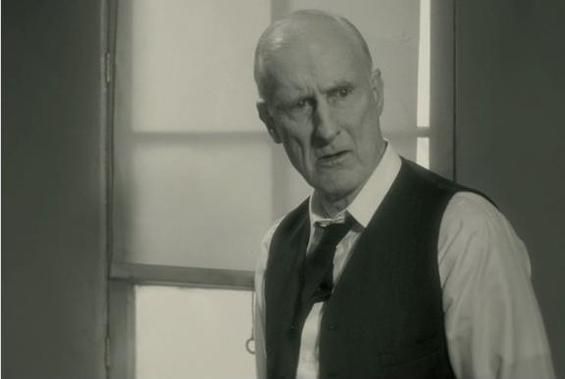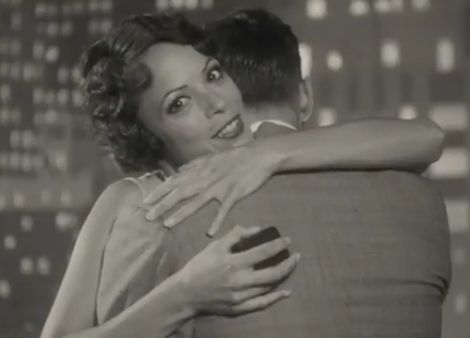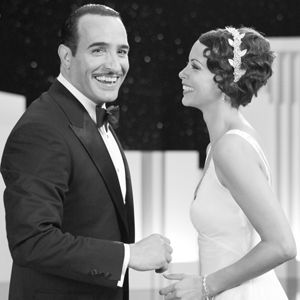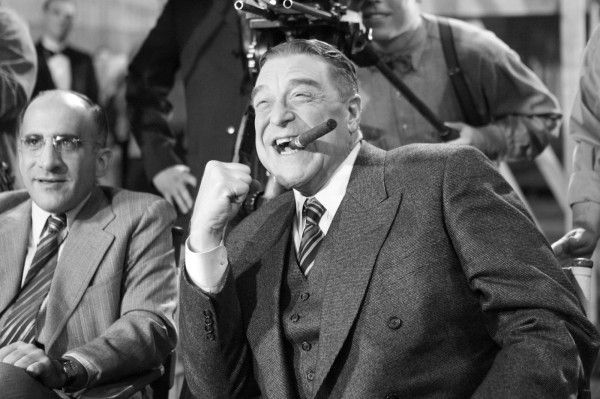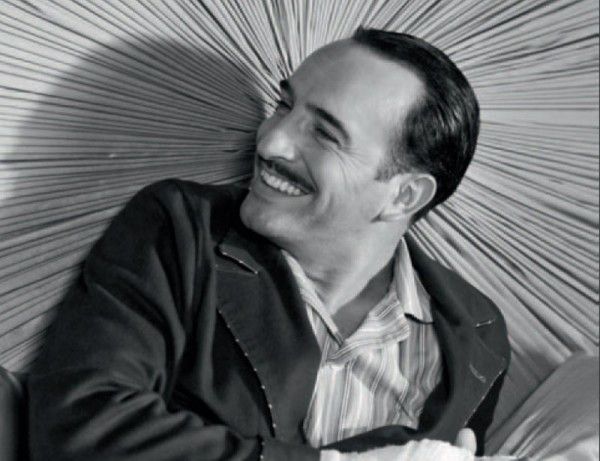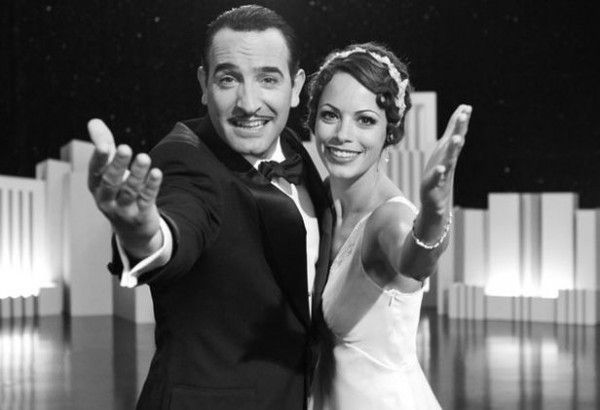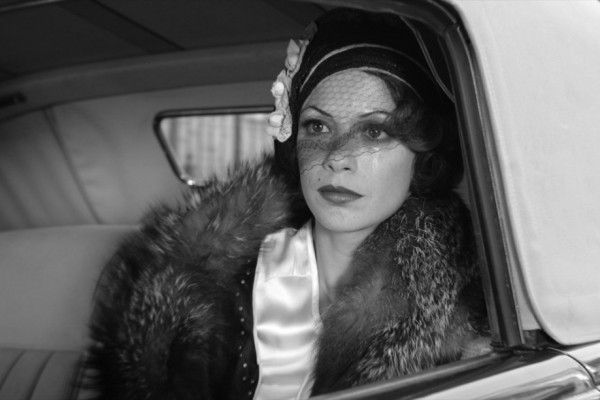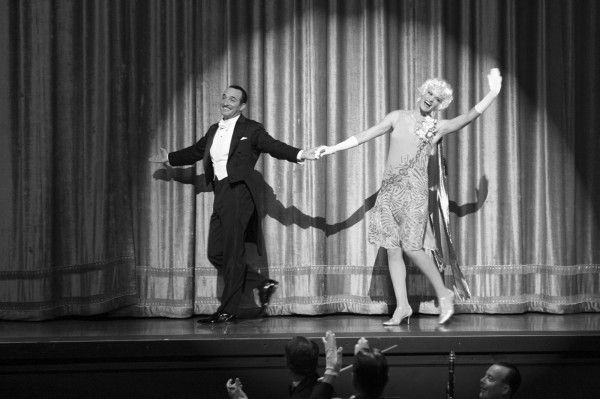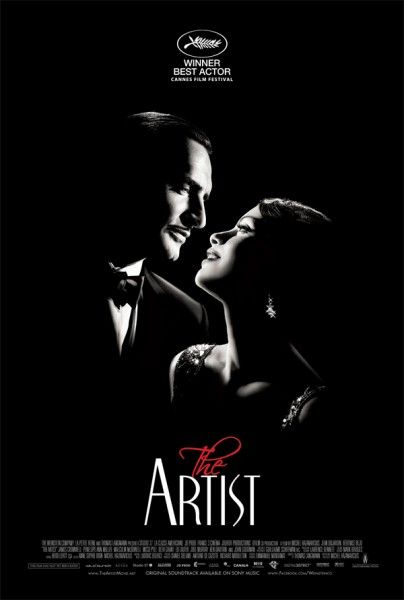The Artist, a film without dialogue and only a handful of supporting roles, attracted an ensemble of accomplished, well known actors including James Cromwell and Penelope Ann Miller. Cromwell, who plays silent film star George Valentin’s devoted chauffeur, thought the project was too good to pass up after he saw director Michel Hazanavicius’ detailed storyboards which revealed a very clear vision. Penelope Ann Miller, who portrays George’s increasingly disaffected wife, was also intrigued by the notion of acting in a feature-length silent. The period setting held great appeal to the actress, a lifelong movie buff who is extremely knowledgeable about Hollywood cinema history.
We sat down with Cromwell and Miller at a roundtable interview to talk about the challenges of doing a silent film. They told us how director Michel Hazanavicius created a perfect environment for the actors that helped put them in the moment, why the artistic excellence of everybody hired above and below the line enhanced their performances, and how the mannerisms and behavior of an earlier era compare to those of today. They also discussed their latest projects including Cromwell’s upcoming films Still, Memorial Day, and A Lonely Place for Dying and Miller’s Saving Lincoln, Robosapien and Saving Grace B. Jones. Cromwell also slammed the former producers of 24 for their irresponsible treatment of torture on the show.
So what were the challenges of doing a silent film?
PENELOPE ANN MILLER: Well, I think nowadays we are so used to hearing our voices and relying on the inflections and conveying our emotions through the timbre of our voice. The daunting task here is that we have to rely on our faces and our feelings and our expressions, and then again, not being over the top and trying to be authentic to the period. It’s slightly more exaggerated because of how it’s filmed and the mannerisms were different in that era. So it was a fine line and you didn’t want to cross it. We had to rely on our director as well.
Did you ever dream you’d get a chance to do a silent film in this modern age of movies?
JAMES CROMWELL No.
MILLER: I had the experience doing Chaplin. I did the film Richard Attenborough directed with Robert Downey Jr. and I played Edna Purviance. We got to do a couple movies within a movie, a couple of the vignettes or scenes. I had done a silent film so I did have a little bit of experience. I guess I’m the go-to girl if you’re going to make a silent movie.
So you’ve done two. You need to share now with others.
MILLER: No, I’m going to take over the market.
CROMWELL Well, actually I just realized this in the other interviews. I only had 16 lines in Babe but I was on screen a lot. So I’ve done a bit of silent acting as well.
MILLER: He’s had some experience as well. We’re the veterans of the silent film acting.
Were there any silent films that you watched for inspiration?
MILLER: I had watched a lot of Chaplin films because I did the film and I was also playing an actress who lived at that time and was a silent film star. So yes, I had definitely watched a lot of silent films, but I think this movie goes beyond the silent films. It’s homage to so many of the classics and so many of the classic actors from the 20s, 30s, 40s and 50s. He takes a little something from everybody. In fact, when you see Jean Dujardin’s performance, you really see a Douglas Fairbanks meets a Clark Gable meets an Errol Flynn. I mean he’s sort of a combination of all these incredible actors - some silent, some not.
CROMWELL You know it really isn’t a silent film. It’s silent for Jean and Bérénice (Bejo) because they play actors who are in films in which there is no recorded dialogue. But for us, we still speak, you still hear things. It’s just that it’s not recorded. In that sense, it’s not a silent film. So watching a silent film actor and what they did in a silent film, that’s not how I’m going to play it. I mean, I make a joke. I went back and watched Murder by Death because I played a chauffeur in that.
MILLER: So you could go back to your old tricks!
CROMWELL That’s all I had to do (laughs). I studied myself.
MILLER: Study yourself – I love that!
James reminded me of the chauffeur from Sunset Blvd. Missi Pyle’s character reminded me of that woman from Singin’ in the Rain. All these characters tap into this archetypal language of film that has accumulated over the years. Did you look at a lot movies to capture that?
CROMWELL It’s not good to play –
MILLER: -You don’t want to mimic.
CROMWELL No, you don’t want to mimic and you don’t want to get something set in your head so you’re repeating something else. You want it to happen in the moment the way you do in any other film. I don’t think it really helps. I don’t study films particularly. I plan to direct but I’m not watching film – I watch the entire film to see how the story goes but I don’t say, ‘oh, so he does a slow pan here, or he pulls here, watch the crane shot, or look at the composition,’ because it’s got to be my eye.
MILLER: I think you can be inspired by other filmmakers and other performers. Obviously, Michel (Hazanavicius) , the director and writer, was inspired by many classic films and directors. For me, I think though having always had a love for old films and the actresses of other periods, I maybe had a sensibility of an essence that they had. And like I said, in the mannerisms – people dressed differently, they carried themselves differently, they spoke differently. I was a woman of wealth, so I’m going to have a different manner in which I speak and hold myself. The costumes play a huge part of it, the makeup and hair, the setting, the china. I mean, all of that plays a part. It’s a tribute to Michel’s vision because he creates an environment that helps you feel the moment. He plays music in the background, everybody he hired above and below the line was so artistically excellent that you just felt well taken care of.
What’s the difference in mannerisms between that period and now?
CROMWELL I have a little different take on it. We don’t celebrate the difference so much as the sameness of the way people are. This is a story that could be a contemporary story as well. Now there is some difference and I think the difference is in the attitude that people had towards each other. I don’t know whether we still have two cops or if a cop today would run after a dog or would have a long conversation about formal wear without some ‘move along, move along.’ I think there’s a lack of cynicism and suspicion and aggression. I think people were more forgiving.
MILLER: More loyal.
CROMWELL More loyal -- well, there’s loyalty today and there’s forgiveness today, but as a whole it seems to have been a simpler time.
MILLER: Also, when you think about a chauffeur, I mean, first of all not many people have them these days. I mean, often movie stars don’t constantly have the same person driving them. And there was a pride in your profession. So many people now are just trying to get ahead. They’re a driver but they’re really an actor or they want to be a singer or a writer or whatever. But he was a chauffeur and that was his job and he took great pride in being a chauffeur. Without sounding condescending, he kind of knew his place. He wasn’t striving to be something else. He was devoted to his employer. That, to me, seems different.
In what ways is Hollywood the same now as it was back then?
CROMWELL My sense is, for all intents and purposes, it’s the same. There are feds, there are changes in technology and there are changes in technology right now.
MILLER: There are always newcomers coming up stealing everyone’s roles (laughs) and husbands! Okay, go ahead.
CROMWELL Yeah, it’s just interesting that the focus of this is on an artistic dilemma and not on the sort of smarminess that we are used to. At this particular moment, I just saw an egregiously awful film which seemingly, every line of it was salacious and horrible to an extent that I couldn’t watch it. And everybody in the audience, well not everybody, I didn’t talk to everybody, but they seemed to go right along with it.
Do you mind saying what it was?
CROMWELL I probably should not say what it is. (laughs) It’s just about to come out.
MILLER: Oh! Is that a hint? I had an experience like that but it was a different movie.
CROMWELL It’s such a joy. They made wonderful films then and some of them were awful, but they made wonderful films then and they make wonderful films now, and I think they’re very similar. The emphasis has always been on story, story, story. It’s not the camera moves; it’s not the technology. You know, as much as Cameron Niles thought, I always thought that was the real mistake of Titanic, I must say. There was so much emphasis on the china and the little black dots on the ship that there was a lack of story. It was blown way, way out of proportion to my mind. When you get the head of Universal apologizing to an audience about the pictures that Universal makes, that they’re making really bad pictures, $180 million pictures with big stars and all that attention, you think, why? Why is it not a good picture? They throw all the technology at it but what they don’t have is a story. They don’t have a script. Men in Black doesn’t have a script. They greenlit it, it went, they paid for it and now it’s stalled because they can’t figure out how to go to the next step. The genius of Michel is that he had such a clear idea about what he wanted to do with this.
MILLER: He takes every cliché in the book but he makes it so unique and beautiful to watch. You know, the dog, the love story, the dance at the end, we’re all going to feel joyful at the end. He takes all those clichéd type of experiences and makes them unique and original and reinvents them and makes them exciting to watch.
One thing has changed since the studio system is gone –
CROMWELL We have another system that’s just as bad as the studio system. It’s called packaging, which is just as detrimental because now instead of one guy like Sam Goldwyn or the Warners collecting a stable of wonderful actors who they had writer’s write particularly for, now it’s all done through one or two or three agencies, who now once they cast the lead role because he’s bankable, attach all the other people to it, and no one else gets a chance to do it and you see the same people over and over again.
So the studios have $180 million to spend but they don’t have as much control over the product?
CROMWELL Because they don’t have the vision about how the product is made.
MILLER: They’re not artists and that’s the difference.
What did each of you take away from this particular film and experience?
CROMWELL A lot of pride, a lot of joy.
MILLER: To me, this film is a love letter to not only filmmaking but art and art forms. Movies can be an art form and a beautiful one and there’s a tremendous amount of pride in doing it. I just love that we can go back to the simplicity and the basic form of it and still realize how beautiful and moving and uplifting it can be. To be a part of an experience that we can share with everyone is pretty exciting.
Penelope, you’re going to be playing Mary Todd Lincoln in Saving Lincoln.
MILLER: Yes, I just did that this summer.
How was that?
MILLER: Oh my gosh, she is a trip, that woman. It was really fun, and really challenging and really exciting. You look at me now and you say, how is that possible that she played Mary Todd Lincoln? But that was the joy and fun of it. And reading about her, I just find her infinitely fascinating. I just wanted to say one thing about that film, as we’re talking about taking the old and bringing it to modern day, we’ve filmed the movie in color, but the background is going to be in 3D original vintage photographs from that period. So it’s actually mixing the color with the black and white and blending the two. It’s a format called cinecollage and it’s never been done before. We filmed it all on a sound stage. Then, the two other films I have coming out are Robosapien, a family adventure film about a robot, which is very popular -- I go from silent films to robots -- and a tragedy based on a true story called Saving Grace B. Jones, which is coming out soon. I don’t know the date. It’s with Tatum O’Neal.
And James, you have several films as well.
CROMWELL Yes, I have three.
Briefly what are the characters?
CROMWELL I play an 89-year-old man whose wife has Alzheimer’s in a movie called Still. I play a World War II veteran, I acted with my son and it’s called Memorial Day. And I have a film called A Lonely Place For Dying which is the most watched film on the internet, over 3 million hits, more than any of Hollywood’s films.
So it’s playing online?
CROMWELL They put it on BitTorrent because they couldn’t get a distribution deal.
James, are you still involved with PETA?
CROMWELL Yeah.
Anything new on the animal front for you?
CROMWELL For me particularly, no. But it gets better every day. I think they’re going to put up a concerted campaign against McDonalds because McDonalds is one of the few fast food chains that is still using gestation crates since they have a lot of pig product.
Do you remember working for 24?
CROMWELL “I remember it vividly.”
Was it exciting?
CROMWELL No, it was not exciting. It was very disappointing.
Really? Why?
CROMWELL I think the show was irresponsible in its presentation of torture, so much so that the commandant of West Point came to the set to ask the producers to change their attitude towards torture because his graduates, which were going as first lieutenants to Afghanistan and Iraq, were using Jack Bauer’s techniques to get information out of suspects – sticking knives in their thighs and turning them -- and he asked them to change it and they said, ‘Listen, if you have a problem with American foreign policy, talk to the President. We’re just making television.’ I thought that was highly irresponsible. I just thought that it got out of hand. I thought there was another way to do it. They could have changed it, and it would have been a very, very important thing, but their politics, they have no politics, and if you don’t have any politics when you’re dealing with something like that, then you wind up in the White Paper that was presented to the President of the United States by John Woo as a justification for the war in Iraq and mentioned Jack Bauer, and you think, wow, man. That’s really incredible.
The Artist opens in theaters on November 25th.

